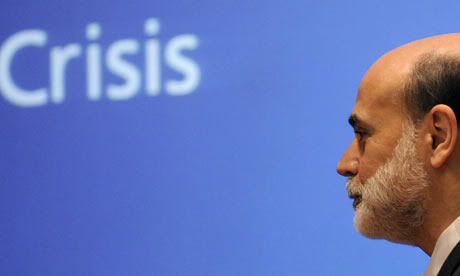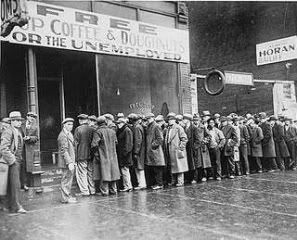(10 am. – promoted by ek hornbeck)
Burning the Midnight Oil for Economic Populism
 crossposted from Voices on the Square
crossposted from Voices on the Square
Yves Smith at the excellent and insightful Naked Capitalism has recently been taking at a close look at the role of the Congressional Budget Office, the vaunted "CBO", in the "fiscal cliff" scam that the corporate aristocracy is attempting to perpetrate on us mere commoners.
On 4 November, 2012, in Fed Budgetary Experts Demolish CBO Health Cost Model, the Lynchpin of Budget Hysteria, Yves looked at how the CBO put its thumb on the scale to exaggerate the magnitude of the fiscal challenge that we face (as I noted just recently, while there is a challenge, there is certainly nothing of the magnitude or urgency to justify treating like a crisis). Yves does this by drawing on the analysis of analysts at the Fed that highlight the questionable and, in at least one case, clearly flawed, assumptions made by the CBO in their modelling. On 14 November, 2012, in The CBO’s Latest Con Job: Disappearing Data to Deter Analysis of its Deficit Scaremongering, Yves looks at how the CBO fudges the numbers, omitting figures it once included in the fine print of CBO analyses … after it has been pointed out that taking those figures into account, the CBO modelling implies debt staying below 80% of GDP through 2020, rather than rising to about 90% of GDP in 2022 as the CBO has been claiming.
However, those two are a bit "wonky", to use a term beloved of the recently losing VP nominee. They bookend a post in which Yves Smith points out the suspect behavior of the CBO in terms that are a bit less "wonky". And that is what I am taking a look at myself, in this essay.
Advocacy? Well, if it walks like a duck …
 This following point, however, is not wonky at all. On 11 November 2012, in The Lady Doth Protest Too Much: CBO Director Asks for a Chat Regarding Our Post on Their Questionable Health Cost Increase Model, Yves Smith tells us that she got an email from the CBO director regarding the 4 November piece, in which Yves pointed out the analysis of Glenn Follette and Louise Sheiner … where Glenn Follette is the chief of the Fed's fiscal analysis, and Louise Sheiner is a member of that group, and has previously worked for both the Treasury and the Council of Economic Advisers.
This following point, however, is not wonky at all. On 11 November 2012, in The Lady Doth Protest Too Much: CBO Director Asks for a Chat Regarding Our Post on Their Questionable Health Cost Increase Model, Yves Smith tells us that she got an email from the CBO director regarding the 4 November piece, in which Yves pointed out the analysis of Glenn Follette and Louise Sheiner … where Glenn Follette is the chief of the Fed's fiscal analysis, and Louise Sheiner is a member of that group, and has previously worked for both the Treasury and the Council of Economic Advisers.
After sharing his reaction to getting an email from the CBO director, Yves Smith moves on to point out the following regarding the recent work of the CBO:
But to get a sense of what is at stake, if you read the newest CBO document on the deficit, it is not a dispassionate analysis of budget math alternatives. This is an advocacy document. It has the tone, the use of overly simplified language (below 8th grade level, which is the level used to spoon feed journalists, as opposed to higher reading levels that you see in other types of reports. Contrast both the look and the writing style with this FHFA Inspector General report, as an example: text paragraphs, no nice bullet points and generous use of white space, not much coddling of the reader).
A simple illustration: look at how this paragraph on the first page is not an analysis of budgetary options, which is the CBO’s role. This shows the CBO pushing for a particular set of outcomes (taking immediate steps to reduce the deficit) rather than simply providing analysis of the budgetary outcomes of specific legislative actions (click to enlarge):
- What are the Consequences of Rising Federal Debt?
- Higher Federal Spending on interest payments
- A reduction in national saving
- limits on policymakers' ability to use tax and spending policies to respond to unexpected challenges, such as economic downturns, natural disasters or financial crises; and
- An increase in the likelihood of a fiscal crisis, in which investors would lose confidence in the government's ability to manage its budget, and the government would thus lose the ability to borrow at affordable interest rates.
{NB. in the original, Yves Smith presents this as a screen capture}
Man, when I saw this load of tripe, I wanted to hit my head against a wall.
Under real world economics ~ the kind of economic that was used to predict the Panic of 2008 that mainstream economists claimed afterwards was impossible to see coming ~ its patent nonsense.
Regarding the interest rate, government is never under a technical necessity to default on debt denominated in dollars, so if any such default risk presents itself, that is a deliberate policy choice to default, not a result of the share of debt in the economy.
And the Federal Reserve has the capacity to pursue a specific interest rate target, aside from risk premiums, so the amount of interest payments that the Treasury must make on the debt is a deliberate policy choice, and not a result of the share of debt in the economy.
As far as limiting the government's ability to react to shocks, that is nonsense: when the proper response to a shock is to run a deficit, as with an economic downturn or financial crisis, there is no risk of demand-pull inflation from monetising that deficit. When there is one or a series of natural disasters that so affect our productivity that spending to address the disaster requires us to cut back on other things, then just as during full mobilization for war (as in WWII), what is required is a shift in resources at that point in time, and we would still have to cut back on those other things even if there was no public debt outstanding at all.
The risk of financial crisis comes from unsustainable private debt burden ~ which is still in the extremely risky neighborhood of 200% of GDP, while we are being distracted by a phony trumped-up crisis regarding government debt. The risk of fiscal crisis is avoided by retaining our sovereignty over our US dollar.
The claim regarding savings is not true, but it does not require debunking, since even if it were true, so what? The financial system can generate new credit-money to lend if there are credit worthy borrowers to lend to, and if there are, that lending will create economic growth, which will lead to more income from which to save. A "lack of saving" may mean that the corporate aristocracy does not accumulate further economic power, but it represents no serious problem for the productive sector of our economy.
But this argument works with mainstream economics too!
The great thing about the Naked Capitalism article when it raises these issues is that it points out that even under mainstream economics, the CBO argument is a load of nonsense.
 Paul Krugman ~ who, even though his politics is liberal, is also a Nobel Prize Winner, and so you can be quite sure his economic modelling is impeccably mainstream ~ took a look at this question. I am not going to step through his model, but rather step forward to his explanation of the result of a "loss of confidence" in US bonds, given that we have our own money supply and a floating currency:
Paul Krugman ~ who, even though his politics is liberal, is also a Nobel Prize Winner, and so you can be quite sure his economic modelling is impeccably mainstream ~ took a look at this question. I am not going to step through his model, but rather step forward to his explanation of the result of a "loss of confidence" in US bonds, given that we have our own money supply and a floating currency:
Think about it this way: with the Fed setting interest rates, any loss of confidence in U.S. bonds would cause not a rise in rates but a fall in the dollar – and a fall in the dollar would be a good thing, helping make US industry more competitive.
In short, a loss of confidence in US bonds would lead to economic expansion, within the US productive sector, because we shift toward an exporter's exchange rate and away from an importer's exchange rate.
So, even if an increase debt share leads to a loss in overseas confidence in the US dollar, because it is the US dollar, which the US Fed can regulate and which floats in international exchange rate markets, there is no reason to expect the result to crowd out economic activity.
It would have effects: (1) it would reduce the power overseas of credit-money leveraged in US capital markets for spending overseas, (2) and it would (because of the move away from an importer's rate) likely mean a modest reduction in the purchasing power of a given US$. But the deeper the drop, the greater the boom in US-based economic activity. Given an expansionary economy, employers have to work harder to hire and retain employees, and given a dropping exchange rate, which weakens the opportunities for outsourcing for financial advantage, there would be a serious risk ~ to the corporate aristocracy ~ of a shift in the share of US national income away from the aristocracy and toward us commoners.
And while it is understandable why the corporate aristocracy does not want that to happen, that sounds perfectly fine to me.
One particularly egregious way that the CBO seems to be fudging their projections.
 As I said, the discussion of how the CBO is fudging their modelling is a bit wonky, but I do want to highlight this one problem, which gives a taste of the kinds of flaws that show up in their reasoning. This is from the 4 November piece, where Yves Smith is quoting the analysts of the Federal Reserve:
As I said, the discussion of how the CBO is fudging their modelling is a bit wonky, but I do want to highlight this one problem, which gives a taste of the kinds of flaws that show up in their reasoning. This is from the 4 November piece, where Yves Smith is quoting the analysts of the Federal Reserve:
The CBO model produces the peculiar result that government funded plans will show faster cost growth than private plans. From the article:
Our chief concern with their projection is their assumption that per capita spending by Medicare grows much more rapidly than that of the private sector. The projected divergence seems inconsistent with the underlying assumption that policies are unchanged because Medicare and private sector insurance plans have had similar payment rates historically.
What is going on here? The CBO is projecting the trend for Medicare spending to grow faster than private spending. However, that trend does not come from payment rates growing faster, it comes from a series of policy actions expanding Medicare coverage.
Including that trend in their projection is quite clearly and obviously violating their mandate to provide a "baseline" projection that is based on existing policy. Under existing policy, there is no simply no evidence to support a projection that Medicare will rise at a faster rate than private health care spending.
This "existing policy" baseline often results in analysis that outside observers call into question when there is good reason to believe that a policy is unsustainable and must be changed. Still, it is the rule that the CBO operates under, and abandoning it and instead assuming that the pattern of policies expanding Medicare coverage will continue is quite clearly "assuming in" future changes in policy, rather than modeling the consequences of existing policy.
When I see analysis coming out of an institution that overlooks the implications of its own rules of operation, then I am inclined to agree with Yves Smith that, yes, the CBO appears to be stepping into a role of policy advocacy that it is not charged with, and which it would be well advised to abandon.
The Boss Speaks: The River

3 comments
Author
… previous Economic Populist piece on the Fiscal Cliff.